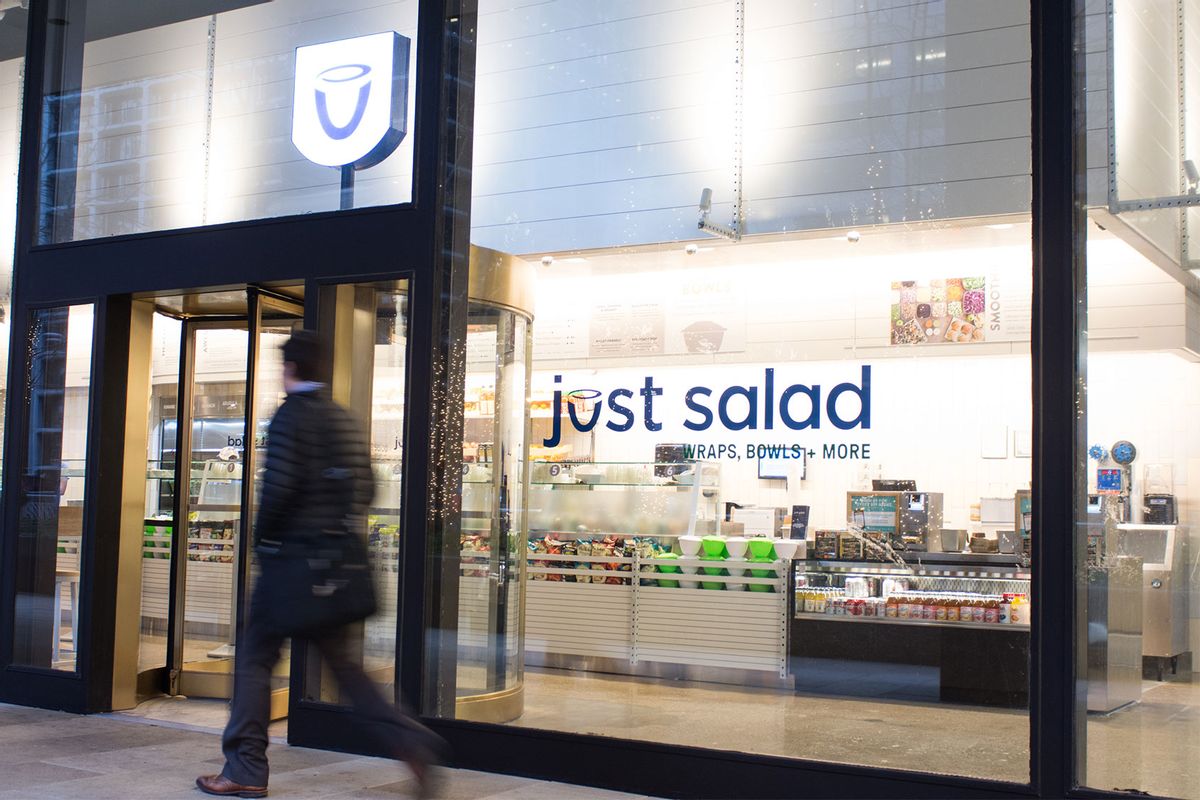In 2011, the television show Portlandia offered up two characters seeking to learn the provenance of their restaurant dinner by tracing the chicken back to its farm and, in the process, offering absurdist commentary on peak foodie culture. A decade later, the bit feels less like parody than earnest baseline to consumers' expanding concerns about the origins of their food and the outcomes of its production. It's no longer enough to know that a chicken named Colin led a happy pastured life eating acorns; restaurant-goers also want assurances that it — and its accompanying side dishes — were raised in ecologically sustainable ways.
To that end, fast casual outlets like Panera and Just Salad are producing carbon scorecards to inform customers about menu options that edge toward climate-friendly, which, according to new research, actually encourages them to order vegetarian. The Good Food Media Network started releasing an annual list of 100 eco-friendly restaurants — rated for "how good [they are] for every link of the food chain" and based on things like local food purchases and operating out of LEED certified buildings — in 2017 (although it's currently on hold).
Increasingly, as a recent survey by the National Restaurant Association found, consumers are also concerned about waste, not just as it pertains to food itself but also to the disposable dishes, utensils, napkins, straws, and condiment packets some of that food is served on and with, collectively known as food serviceware. Some restaurants are seeking to address that concern by switching, at least partly, to reusables.
Tackling monumental waste
Every year in the US, 840 billion pieces of disposable food serviceware are used by restaurants and food-related businesses like corporate cafeterias and large-scale sporting events where food and beverages are served. One organization angling to make a dent in this monumental waste stream, which costs municipalities $6 billion to manage and is estimated to have up to 10 times greater carbon impact than multi-use serviceware, is zero-waste nonprofit Upstream. Collaborating with local governments, other nonprofits and corporations, it's been working to help the food service industry move away from disposables — away even from so-called "better" compostables that can be lined with toxic PFAS "forever" chemicals or made with other environmentally costly (and non-compostable or -recyclable) substances.
"Consumers are demanding better," says Upstream director of business innovation Samantha Sommer. And "businesses wholeheartedly want to do better; they care about the waste they're generating. The heart of the problem is behavior."
Changing it, though, is a multi-tiered process. It starts, on the one hand, with convincing consumers, especially in pandemic times, that "you can't get COVID from drinking from a [reusable] cup," Sommer says. "The dishwasher it goes through is high-test and super-soapy and that's going to kill bacteria of any kind; it took us a solid year to start to dispel this myth."
Just Salad has had a popular reusable "MyBowl" incentive program since it opened in 2006 —opt for a reusable bowl for in-store ordering, get a free topping; the company says this kept 3 tons of packaging out of landfills in 2021. More recently it's launched a Bring Your Own Cup program to address the whopping 120 billion disposable cups Americans use a year, according to ReThink Disposable; Starbucks is bringing back a reusable cup option at all its outposts, too.
Just Salad has also adopted a broader reusable dine-in bowl program at most of its 50-plus US stores that have in-store seating. Since they already "use steel mixing bowls all day long, we are set up to wash so throwing in extra bowls doesn't affect us in terms of washing infrastructure," says chief sustainability officer Sandra Noonan. The challenge: getting customers to throw the bowls into the bus tub and not the trash, which has led the company to design bowls too wide to fit in the trash slots. Just Salad is also experiencing "pain points" with a two-store pilot of reusables for takeout. "The struggle is that customers don't want to slip that bowl into their briefcase or purse, or they just don't want to wash it," Noonan says.
In some cases, it's the restaurants that need behavior incentives. Says John Charles Meyer, who founded nonprofit Plastic Free Restaurants in 2020 to help restaurants and schools — 57 of them to date — replace plastic disposables, "When I started the organization, it seemed like the main barrier to making these switches was monetary; if you eliminated the financial hurdle, then everybody would just do it right. Turns out change is difficult, whether it's because of dishwasher infrastructure, or training people to do new things, or storage and inventory, or just, We've been doing this for 25 years and I don't want to do it differently."
Some restaurants need proof that switching to reusables will save them money. "When you [get] down to brass tacks you say, You're spending [this] much money to purchase thousands of these 27 disposable items to run your business every week, and you're spending this much money on your waste hauling bill downstream to just throw all that crap away — that's a huge amount of cost impact to your bottom line," Sommer says.
There is cost involved in purchasing reusables and infrastructure like bus tubs and rolling carts; and "fear about, Oh the customers will hate it and we'll lose all the forks," Sommer says. But return on investment — usually for swapping out some disposables for on-site dining — can happen in a few months. (Although Noonan says Just Salad's toppings incentive renders its MyBowl program cost neutral rather than generating savings.) By which point restaurants might also realize that another fear — of water wasted by running a dishwasher upwards of a dozen times a day — is similarly unfounded. New industrial dishwashers, Sommer points out, run on very short cycles that use water extremely efficiently.
The role government can play
A number of cities and Washington State have passed zero food-service waste legislation, although these, too, require multiple tiers and stages: starting with a Styrofoam and/or straw ban such as in Washington, DC, for example, or a ban on plastic utensils and condiment packets for takeout unless a customer expressly asks for them, as both New York City and State are now trying to do. Berkeley, California has banned single-use plastic serviceware for all on-site dining, forcing even mega-chains like Taco Bell and McDonald's to figure out how to reuse dishes and flatware.
These kinds of targeted initiatives could have ripple effects, according to Eric Goldstein, New York City environmental director for Natural Resources Defense Coalition (NRDC). Seeing how much savings such a switch could engender might convince big brands to roll out reusables in other markets. "Places like Berkeley are often proving grounds for strategies that at first blush seem unworkable but [eventually] prove just to have been ahead of their time," Goldstein says
For smaller restaurants, some cities and counties in California provide a little funding and in-person consultations on how to swap out single-use items. "You may have to give a longer lead time for small businesses because you want to be sensitive to the short-term economics and tight budgets a lot of them work on," says Goldstein. "But over time it will have broad-ranging societal benefits in terms of addressing the climate crisis. Ninety-nine percent of plastics are made from fossil fuels so we're going to have to find ways of producing less throw away plastics." Restaurants, he says, "are a great place to start."
Sommer now focuses much of her work on getting the likes of large corporations, which may serve tens of thousands of employees in a day, to switch to reusables in their cafeterias, snack bars, and elsewhere. More challenging is figuring out how to do the same at big outdoor events, where enormous numbers of beer cups and to-go food containers are used and tossed in an evening.
"It's really complicated because you have to work with each individual food truck to train them and get them on board and maybe not everybody's food menu item fits in a [paper-lined] reusable basket," Sommer says. There also needs to be some sort of easily accessible hub where reusable dishes can be washed, and a waste hauler who can transport vast amounts of dishes — and infrastructure to do this still needs to be built. But to scale, money needs to be forthcoming from public/private partnerships. And municipalities need to keep the ball rolling on single-use bans.
"Governments can do 1,000 times what we're going to accomplish with the stroke of a pen," says Meyer. "I hope every [municipal] government figures out how to outlaw single-use plastic in the next five years and then I can close up shop. But until that time, we're here to help around the edges where we can."


Shares